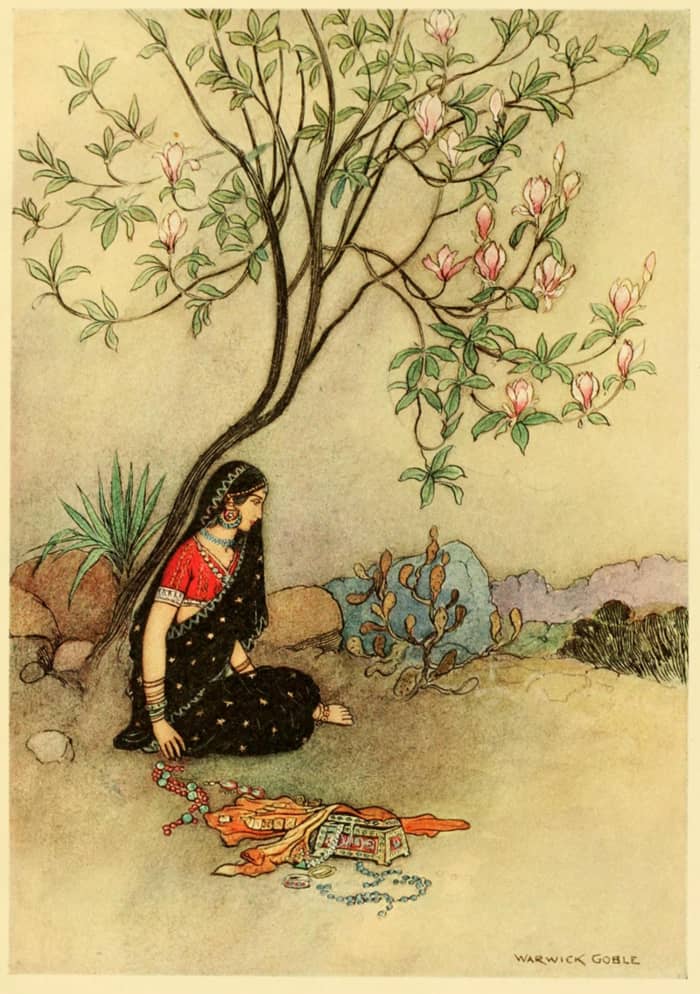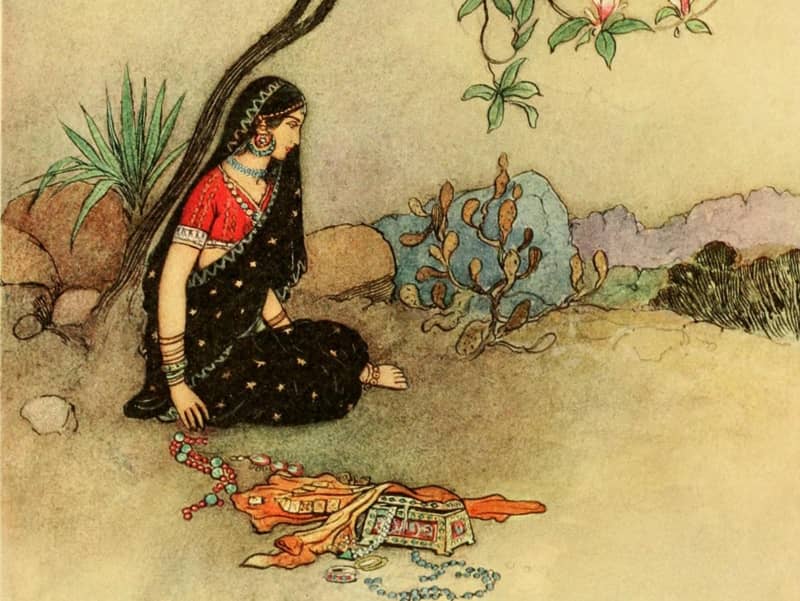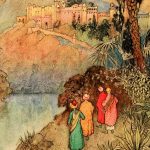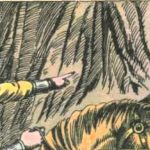- The Field of Bones (Folk-tales of Bengal)- Part I
- The Field of Bones (Folk-tales of Bengal)- Part II
They entered the seventh court, and there and then, for the first time, did they see living human beings. They saw coming towards them four princesses of matchless beauty.
Each of these four princesses caught hold of the arm of each of the four friends, and each princess called each man whom she had caught hold of her husband. The princesses said that they had been long waiting for the four friends, and expressed great joy at their arrival. The princesses took the four friends into the innermost apartments and gave them a sumptuous feast. There were no servants attending them, the princesses themselves bringing in the provisions and setting them before the four friends.
At the outset, the four princesses told the four friends that no questions were to be asked about the depopulation of the city. After this, each princess went into her private apartment along with her newly-found husband. Shortly after the prince and princess had retired into their private apartment, the princess began to shed tears.
On the prince inquiring into the cause, the princess said, “O prince! I pity you very much. You seem, by your bearing, to be the son of a king, and you have, no doubt, the heart of a king’s son; I will therefore tell you my whole story, and the story of my three companions who look like princesses. I am the daughter of a king, whose palace this is, and those three creatures, who are dressed like princesses, and who have called your three friends their husbands, are Rakshasis. They came to this city some time ago; they ate up my father, the king, my mother, the queen, my brothers, my sisters, of whom I had a large number. They ate up the king’s ministers and servants. They ate up gradually all the people of the city, all my father’s horses and elephants, and all the cattle of the city. You must have noticed, as you came to the palace, that there are no human beings, no cattle, no living thing in this city. They have all been eaten up by those three Rakshasis. They have spared me alone—and that, I suppose, only for a time. When the Rakshasis saw you and your friends from a distance, they were very glad, as they meant to eat you all up after a short time.”
King’s son. But if this is the case, how do I know that you are not a Rakshasi yourself? Perhaps you mean to swallow me up by throwing me off my guard.
Princess. I’ll mention one fact that proves that those three creatures are Rakshasis, while I am not. Rakshasis, you know, eat food a hundred times larger in quantity than men or women. What the Rakshasis eat at a table along with us is not sufficient to appease their hunger. They therefore go out at night to distant lands in search of men or cattle, as there are none in this city. If you ask your friends to watch and see whether their wives remain all night in their beds, they will find they go out and stay away a good part of the night, whereas you will find me the whole night with you. But please see that the Rakshasis do not get the slightest inkling of all this; for if they hear of it, they will kill me in the first instance, and afterwards swallow you all up.
The next day the king’s son called together the minister’s son, the prefect’s son, and the merchant’s son, and held a consultation, enjoining the strictest secrecy on all. He told them what he had heard from the princess, and requested them to lie awake in their beds to watch whether their pretended princesses went out at night or not. One presumptive argument in favour of the assertion of the princess was that all the pretended princesses were fast asleep during the whole of the day as a consequence of their nightly wanderings, whereas the female friend of the king’s son did not sleep at all during the day.
The three friends accordingly lay in their beds at night pretending to be asleep and manifesting all the symptoms of deep sleep. Each one observed that his female friend at a certain hour, thinking her mate to be in deep sleep, left the room, stayed away the whole night, and returned to her bed only at dawn.
During the following day, each female friend slept out nearly the whole day and woke up only in the afternoon. For two nights and days, the three friends observed this. The king’s son also remained awake at night pretending to be asleep, but the princess was not observed for a single moment to leave the room, nor was she observed to sleep in the day. From these circumstances, the friends of the king’s son began to suspect that their partners were really Rakshasis as the princess said they were.
By way of confirmation, the princess also told the king’s son, that the Rakshasis, after eating the flesh of men and animals, threw the bones towards the north of the city, where there was an immense collection of them.
The king’s son and his three friends went one day towards that part of the city, and sure enough, they saw immense heaps of the bones of men and animals piled up into hills. From this, they became more and more convinced that the three women were Rakshasis in deed and truth.
The question now was how to run away from these devourers of men and animals. There was one circumstance greatly in favour of the four friends, and that was, that the three Rakshasis slept for nearly the whole day; they had therefore the greater part of the day for the maturing of their plans.
The princess advised them to go towards the seashore and watch if any ships sailed that way. The four friends accordingly used to go to the sea- shore looking for ships. They were always accompanied by the princess, who took the precaution of carrying with her in a bundle her most valuable jewels, pearls and precious stones. It happened one day they saw a ship passing at a great distance from the shore.
They made signs which attracted the notice of the captain and crew. The ship came towards the land, and the four friends and princess were, after much entreaty, taken up. The princess exhorted the crew to row with all their might, for which she promised them a handsome reward; for she knew that the Rakshasis would awake in the afternoon, and immediately come after the ship; and they would assuredly catch hold of the vessel and destroy all the crew and passengers if it stood short of eighty miles from land, for the Rakshasis had the power of distending their bodies to the length of ten Yojanas (A yojana is nearly eight miles).
The four friends and the princess cheered on the crew, and the oarsmen rowed with all their might; and the ship, favoured by the wind, shot over the deep like lightning. It was near sun-down when a terrible yell was heard on the shore. The Rakshasis had wakened from their sleep, and not finding either the four friends or the princess, naturally thought they had got hold of a ship and were escaping. They therefore ran along the shore with lightning rapidity, and seeing the ship afar off they distended their bodies.
Fortunately, the vessel was more than eighty miles off land, though only a trifle more: indeed, the ship was so dangerously near that the heads of the Rakshasis with their widely distended jaws almost touched its stern.
The words that the Rakshasis uttered in the hearing of the crew and passengers were—”O sister, so you are going to eat them all yourself alone.” The minister’s son, the prefect’s son, and the merchant’s son had all along a suspicion that the pretended princess, the prince’s partner, might after all also be a Rakshasi; that suspicion was now confirmed by what they heard the three Rakshasis say. Those words, however, produced no effect in the mind of the king’s son, as from his intimate acquaintance with the princess he could not possibly take her to be a Rakshasi.
The captain told the four friends and princess that as he was bound for distant regions in search of gold mines, he could not take them along with him; he, therefore, proposed that on the next day, he should put them ashore near some port, especially as they were now safe from the clutches of the Rakshasis.
On the following day, no port was visible for a long time; towards the evening, however, they came near a port where the four friends and the princess were landed. After walking some distance, the princess, who had never been accustomed to taking long walks, complained of fatigue and hunger; they all therefore sat under a tree, and the king’s son sent the merchant’s son to buy some sweetmeats in the bazaar which they heard was not far off.
The merchant’s son did not return, as he was fully persuaded in his mind that the king’s son’s partner was as real a Rakshasi as the three others from whose clutches he had escaped. Seeing the delay of the merchant’s son, the king’s son sent the prefect’s son after him; but neither did he return, he being also convinced that the pretended princess was a Rakshasi. The minister’s son was next sent, but he also joined the other two. The king’s son then went to the shop of the sweetmeat seller where he met his three friends, who made him remain with them by main force, earnestly declaring that the woman was no princess, but a real Rakshasi like the other three. Thus the princess was deserted by the four friends who returned to their own country, full of the adventures they had met with.

In the meantime, the princess walked to the bazaar and found shelter for a few days in the house of a poor woman, after which she set out for the city of the four friends, the name and whereabouts of which city she had learnt from the king’s son.
On arriving at the city, she sold some of her costly ornaments, pearls and precious stones, and hired a stately house for her residence with a suitable establishment. She caused herself to be proclaimed as a heaven-born dice player and challenged all the players in the city to play, the conditions of the game being that if she lost it she would give the winner a lakh of rupees, and if she won it she should get a lakh from him who lost the game. She also got authority from the king of the country to imprison in her own house anyone who could not pay her the stipulated sum of money.
The merchant’s son, the prefect’s son, and the minister’s son, who all looked upon themselves as miraculous players, played with the princess, paid her many lakhs, but being unable to pay her all the sums they owed her, were imprisoned in her house. At last, the king’s son offered to play with her.
The princess purposely allowed him to win the first game, which emboldened him to play many times, in all of which he was the loser; and being unable to pay the many lakhs owed her, the prince was about to be dragged into the dungeon, when the princess told him who she was. The merchant’s son, the prefect’s son, and the minister’s son were brought out of their cells; and the joy of the four friends knew no bounds. The king and the queen received their daughter-in-law with open arms and with demonstrations of great festivity.
Everyone in the palace was glad except the princess. She could not forget that her parents, her brothers and her sisters had been devoured by the Rakshasis and that their bones, along with the bones of her father’s subjects, stood in mountain heaps on the north side of the capital.
The prince had told her that he and his three friends had the power to give life to bones. They could then reconstruct the frames of her parents and other relatives; but the difficulty lay in this—how to kill the three Rakshasis. Could not the hermit, who taught them to give life, not teach also how to take away life? In all likelihood, he could. Reasoning in this manner, the four friends and the princess went to the temple of the hermit in the forest and prayed to him to give them the secret of destroying life from a distance by a charm.
The hermit became propitious and granted the boon. A deer was passing by at the moment. The hermit took a handful of water, repeated over it some words which the king’s son distinctly heard, and threw it upon the deer. The deer died in a moment. He repeated other words over the dead animal, the deer jumped up and ran away into the forest.
Armed with this killing charm, the king’s son, together with the princess and the three friends, went to his father-in-law’s capital. As they approached the city of death, the three Rakshasis ran furiously towards them with open jaws. The king’s son spilt charmed water upon them, and they died in an instant. They all then went to the heaps of bones.
The merchant’s son brought together the proper bones of the bodies, the prefect’s son constructed them into skeletons, the minister’s son clothed them with sinews, flesh, and skin, and the king’s son gave them life. The princess was entranced at the sight of the reanimation of her parents and other relatives, and her eyes were filled with tears of joy. After a few days which they spent in great festivity, they left the revivified city, went to their own country, and lived many years in great happiness.
Here my story endeth,
The Natiya-thorn withereth, etc.



